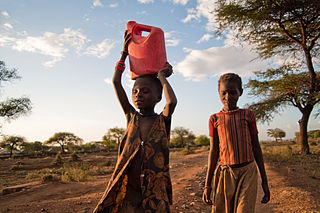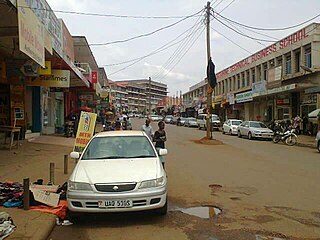
The Adhola people, also known as Jopadhola, are a Nilotic ethnic group of Luo peoples that live in Tororo District of Eastern Uganda and comprise about eight percent of the country's total population. They speak Dhopadhola,, which belongs to the Western Nilotic branch of the Nilotic language family. They are primarily pastoralists. The Jopadhola call their land Padhola which, according to historian Bethwell Ogot, is an elliptic form of "Pa Adhola" meaning the "place of Adhola", the founding father of the Jopadhola people. Officially, land of the Adhola is called Padhola, but the Baganda who misinterpret 'Widoma' – a Dhopadhola word for 'war cry' meaning 'You are in trouble' refer to the Jopadhola as "Badama". The social structure of the Jopadhola can be described as semi centralised because there is no traditional centralized government and its organization is limited to a clan called Nono. There are over 52 clans, each with cultural practices, common ancestry and a distinct lineage.

Yoweri Kaguta Museveni Tibuhaburwa is a Ugandan politician, military officer and revolutionary who is the ninth and current president of Uganda since 1986. His government is considered autocratic.

Culture of Uganda is made up of a diverse range of ethnic groups. Lake Kyoga forms the northern boundary for the Bantu-speaking people, who dominate much of East, Central, and Southern Africa. In Uganda, they include the Baganda and several other tribes

The Karamojong or Karimojong are a Nilotic ethnic group. They are agro-pastoral herders living mainly in the north-east of Uganda. Their language is also known as ngaKarimojong and is part of the Nilotic language family. Their population is estimated at 475,000 people.
The Gisu people, or Bamasaba people of Elgon, are a Bantu tribe and Bantu-speaking ethnic group of the Masaba people in eastern Uganda, closely related to the Bukusu people of Kenya. Bamasaba live mainly in the Mbale District of Uganda on the slopes of Mount Elgon. The Bagisu are estimated to be about 1,646,904 people making up 4.9% of the total population according to the 2014 National Census of Uganda.

Masaka is a district and a city in the Buganda Region in southern Uganda, west of Lake Victoria. The city is the headquarters of Masaka District.

The Gwere people, also called Bagwere, are a Bantu ethnic group in Uganda. They are among the 65 ethnic societies of Uganda. Gwere is the root word, and the people are referred to as Bagwere (endonym) or Mugwere (singular). According to the 2002 Census of Uganda, 23.6% of Bagwere are Roman Catholic, 46.8% are Anglican, 23.9% are Muslim and 3.1% are Pentecostal.
Akena p'Ojok is a former influential Ugandan politician who held various government positions in the 1980s, including Minister of Power, Posts and Telecommunications. He was a prominent figure of Uganda National Liberation Front/Army that helped remove Idi Amin and was involved in the power struggles that followed.

The Soga are a Bantu ethnic group native to the kingdom of Busoga in eastern Uganda.

Samia speaking people live in Western Kenya and Eastern Uganda. They are composed of several clans and their ancient economic activities include fishing in Lake Victoria and other rivers such as River Sio, crop farming (obulimi), and animal farming (obutuki). The Samia speaking people, as widely known by other tribes, predominantly live in Busia districts and speak a dialect similar to the Luhya tribe in Kenya. However, on the Ugandan side there is a slight variation in the dialect spoken by the Samia of Southern Busia on the fringe of Lake Victoria and those of North Busia district closer to Tororo District. The former speak Olusamia while the latter speak Olugwe. The two dialects are difficult to differentiate by non Samia speaking people but easily discernible by the natives. and in Uganda mainly found inbusia and Namayingo district.
The Songora or Shongora are a traditionally pastoralist people of the Great Lakes region of Central Africa located in Western Region, Uganda and Eastern Democratic Republic of the Congo. They have distinctive customs and speak Rusongora, a Bantu language that is similar to Runyankole and Runyoro. The Basongora population in Uganda was reported at numbering 15,897 people in the 2014 census. Although various community estimates put their population at around 40,000 and 50,000 people. Some Basongora also live in Eastern Congo.

The Tooro people, also known as Batooro or Toro people are a Bantu ethnic group, native to the Tooro Kingdom, a subnational constitutional monarchy within Uganda.

The East African Crude Oil Pipeline (EACOP), also known as the Uganda–Tanzania Crude Oil Pipeline (UTCOP), is a 1,443 km crude oil pipeline in planning since 2013, with a foundation stone nominally under construction since 2017 and intended to transport crude oil from Uganda's Tilenga and Kingfisher oil fields to the Port of Tanga, Tanzania on the Indian Ocean.
The Uganda women's national rugby sevens team represents Uganda in international rugby sevens. They compete annually in the Africa Women's Sevens, and have made an appearance in the 2009 Rugby World Cup Sevens at the inaugural women's tournament.

Uganda People's Defence Force Air Force, more commonly known as Ugandan Air Force, is the branch of the Uganda People's Defence Force that deals with the air warfare. Its headquarters is located at Entebbe, Uganda. The current air force commander is Charles Lutaaya, while Emmanuel Kwihangana serves as chief of air staff.

Ugandan folklore includes traditional folktales and other folklore from the African country of Uganda. The convey meaning and experiences from generation to generation. Traditionally, folktales instilled discipline and good behaviour that shaped societal beliefs and norms within Ugandan society.

Edonga Dance, also known as Edonga, is a traditional cultural dance originating from the Karamajong people, an ethnic group of the Nilotic community residing in the northeastern region of Uganda especially in Kotido and Moroto districts. This dance form is performed by both men and women, accompanied by melodious songs sung in the native Karamojong language. Edonga Dance holds significant cultural importance within the community and heritage of the Karamajong people.
Uganda is home to many tribes. Amongst these include the Reli Tribe. This is a minority ethnic group living in Itula sub-county, Obongi district, West Nile-Uganda.This indigenous community was recognized on 1 February 1926 and published in the Constitution of the Republic of Uganda.

The Vonoma people (Tribe) are the smallest tribe in Uganda. Their existing population is approximately 2,613, they are one of Africa's smallest tribes. They are an indigenous tribe that is on the verge of extinction. They have their own language and tribal customs that they adhere to this day. The Vonoma people live in present-day Bundibugyo district in South-Western Uganda. Some Vonoma people migrated from Dr. Congo while fleeing from forced labor orchestrated by the Belgian rule in Congo. Today, the Vonoma people have settled and mixed with other tribes like Baamba, Babwisi, and Batwa in Bundibugyo district. They are led by Omudhingiya (King) called Omudhingiya Martin Kamya Ayongi.














